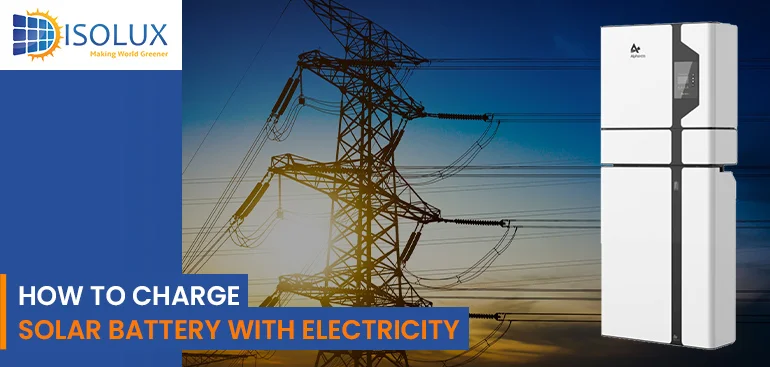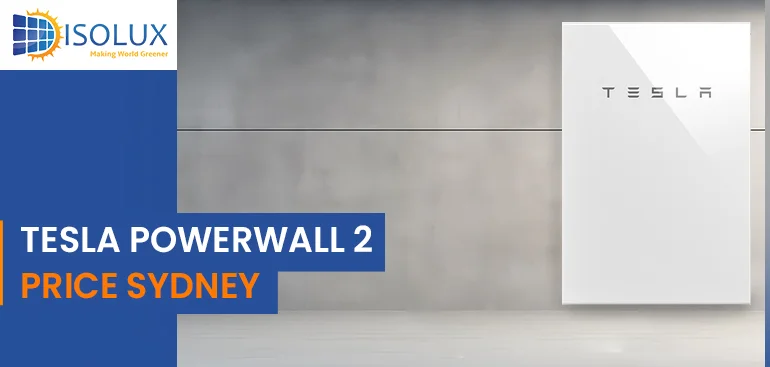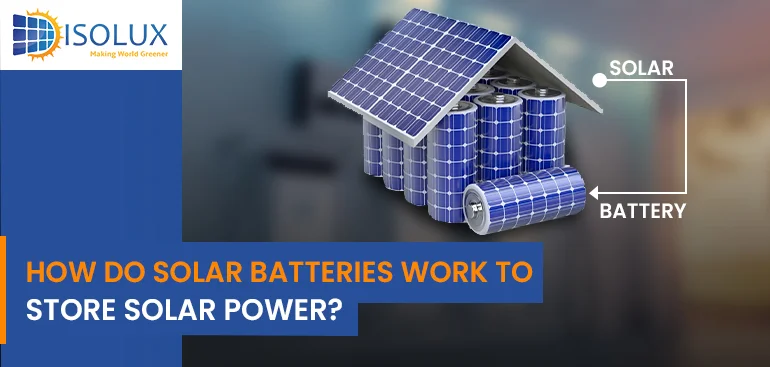Solar batteries revolutionized the way we harness and store energy from the sun. One of the intriguing aspects of this technology is understanding how a solar battery charges with electricity. Let’s get into the details by shedding light on the process, benefits, and workings behind charging a solar battery with grid power.
How to Charge Solar Battery with Electricity
By connecting a solar panel to a rechargeable battery, you can use solar energy even in the absence of sunlight. When your solar panels cannot generate enough power to charge the batteries. You do have an option to charge the solar battery using electricity from the local power grid. But, it’s essential to note that this process allows an electric current to flow through the battery. Thus, charging your solar battery with electricity is a practical solution to maintain a full charge at all times.
Factors to consider while charging
Check when you need to charge: It is essential to know when you need to charge your solar battery. Now, choose the right time to use electricity from the local grid to do this.
Extra costs: Charging batteries from the local grid can add extra charges to your utility bill. Even, if you don’t use electricity to power your appliances.
AC to DC conversion: The electrical grid provides AC power, while the battery operates on DC power. To charge the battery, you will need to convert AC electricity to DC, which can be somewhat inefficient and cause you to lose power.
Timing to Consider: Charging time with grid power can vary depending on battery voltage and charge rate.
Is It Good to Charge Solar Battery with Electricity?
While it is possible to charge your solar battery with electricity. It’s important to consider that solar batteries are designed to run on solar energy. The electricity you carry relying on it to create it can destroy the original purpose.
Also, connecting to batteries can increase your electricity consumption, which can increase your electricity bills. Even if electricity costs are low in your area.
Also, charging batteries with electricity can cause rapid energy dissipation, which can lead to energy loss. Note that charging electricity requires a high voltage, which can reduce or even damage battery life.
The most advisable approach is to use available solar energy to charge your battery whenever possible. And, if needed, use electricity from the grid to top up the battery. Thus, being careful is important while charging the battery, as there is a risk of explosion under certain circumstances.
When Should You Charge the Solar Battery with a Power Grid?
Since grid power is generally more expensive than solar power, it’s important to keep a close eye on your electricity bills. So, if you find the need to charge your solar battery with the power grid, it would be best to do so during a period of peak rate reductions, to save on costs.
In some areas, electricity costs are lower at night due to reduced electricity consumption. Also, there may be days when your photovoltaic (PV) system is not producing enough power during the day. It may not be possible to connect your solar batteries to the grid to charge them. So it becomes important to schedule your charging.
Also read: How Grid Connected Solar PV System Works
AC-Coupled vs. DC-Coupled Batteries
When it comes to charging a solar battery with electricity. There are two primary methods: AC-coupled and DC-coupled.
AC-Coupled Batteries
AC-coupled systems use an extra inverter between the solar panels and the battery. This setup allows the battery to charge from the grid power via the inverter. The advantage of AC-coupled systems is their versatility. As they can work with a wide range of solar panels and inverters.
DC-Coupled Batteries
DC-coupled systems connect the solar panels to the battery. This direct connection enables more efficient charging. As there is minimal energy loss during the conversion process. DC-coupled systems are also known for their high efficiency and are often preferred for their ability to maximize energy capture.
Benefits of Charging a Solar Battery With Grid Power
Charging a solar battery with grid power offers several advantages:
Reliable Backup: Grid charging ensures that your solar battery is always topped up. By providing a reliable backup power source during cloudy days or at night.
Optimized Energy Usage: It allows you to take advantage of lower electricity rates. During off-peak hours, reducing your energy costs.
Grid Stability: By feeding excess electricity back into the grid when your battery is fully charged. you contribute to grid stability and may even earn credits from your utility company.
Extended Battery Lifespan: Grid-charging can help maintain your battery’s health. By preventing deep discharges and extending its lifespan.
Solar Battery Intelligence and Grid Charging
Modern solar battery systems are equipped with intelligent management systems. It will optimize the process of charging with grid power. These systems use sophisticated algorithms to make decisions based on various factors. For example, weather conditions, energy demand, and electricity rates.
Weather Forecasting: Smart solar batteries can access weather forecasts. to predict periods of low sunlight. When cloudy days are expected, the system may draw more power from the grid to ensure enough charge.
Time-of-Use Optimization: Many regions have time-of-use electricity pricing. where rates vary throughout the day. Solar battery intelligence can schedule charging during off-peak hours when electricity is cheaper.
Grid Interaction: Some solar batteries are designed to interact with the grid which benefits both the homeowner and the utility company. Excess energy can be sold back to the grid when rates are high, generating savings or credits.
User-Friendly Interfaces: User-friendly apps and interfaces allow homeowners to track and control their solar battery systems. By providing transparency and control over the charging process.
Conclusion:
Whether you choose AC-coupled or DC-coupled charging, the benefits of grid charging are many. Modern solar battery systems bring a level of intelligence and control that enhances their efficiency and cost-effectiveness. Embracing these innovations can help you make the most of your solar energy storage system and contribute to a sustainable energy future.
Get a solar battery for your solar panel system from Isolux Solar. Contact us today and get a free quote now!




